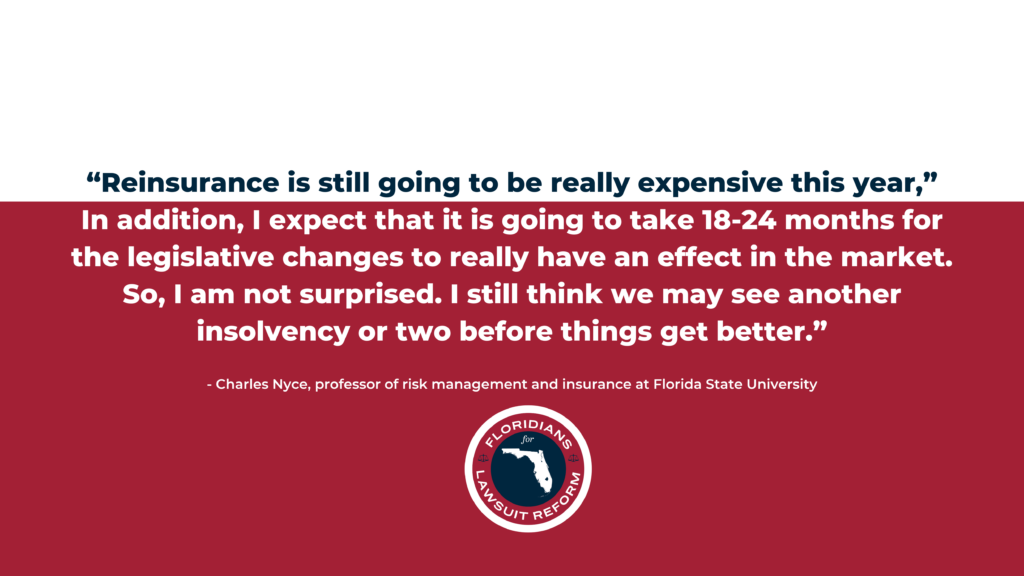
The AM Best financial rating firm’s tepid outlook for Allstate’s Florida subsidiaries, Castle Key Insurance Co. and Castle Key Indemnity Co., has raised new questions about the subsidiaries’ and their parent company’s financial picture.
AM Best last week posted a financial strength rating of “B+ good” for the Castle Key Group of companies, but a long-term credit rating of “bbb-” – “with negative implications.” The lowered credit rating was the result of Castle Key’s “material deterioration in its surplus position as a result of challenging personal property insurance conditions in Florida,” including soaring reinsurance costs, AM Best said in a bulletin.
The news came two months after Allstate announced plans for one of its Castle Key companies to non-renew 33,000 Florida condominium policies this year. AM Best acknowledged that the company “has taken significant corrective underwriting actions and is actively engaged in discussions with state regulators on appropriate capitalization levels.”
“Given the uncertainty regarding the placement of its 2023 reinsurance program and future capital position, the ratings will remain under review until AM Best can fully analyze the impact of these actions,” the rating firm said.
Industry analysts said the less-than-stellar outlook may have more to do with Allstate’s corporate structure and the spiraling cost of reinsurance than with Allstate’s overall financial health, despite the carrier’s heavy net losses in 2022.
“I imagine AM Best wanted to see Allstate refill the surplus bucket at Castle Key Insurance Co. and when it didn’t, sent this shot across its bow,” said David Paul, principal at ALIRT Insurance Research.
He noted that Castle Key Insurance Co. provides all of the reinsurance for Castle Key Indemnity Co. Castle Key Insurance had about 44,000 property insurance policies in force in Florida as of last fall, while CK Indemnity reported more than 278,000 policies, according to the Florida Office of Insurance Regulation.
So, thanks in part to Hurricane Ian’s haymaker in September, and reinsurance costs that have jumped by more than 50% in some cases, Castle Key reported a net underwriting loss of almost $170 million last year and an after-tax operating loss of $133 million, Paul said. But no additional surplus was pumped into Castle Key Insurance, leaving it with a capital ratio that is usually seen as a red flag by regulators.
An Allstate spokesperson did not say why Castle Key’s surplus was allowed to slump. “The cost of providing reliable protection for Florida homeowners has risen dramatically, and we’re taking actions to ensure we can continue to protect our customers over the long haul,” the Allstate media team said in a statement Monday.
It’s the latest negative financial news for Allstate companies. In January, Allstate Corp. said it would end 2022 with a net loss of at least $285 million for Q4 and a combined ratio of 112.6, due in part to weather events around the country. The insurance giant also plans to continue raising auto insurance rates to make up for losses in that sector.
Regardless of the specific reasons, it’s not surprising that Allstate’s Florida subsidiaries are facing difficulties, given the dire state of the market in the Sunshine State in recent years, said Charles Nyce, professor of risk management and insurance at Florida State University.
“Reinsurance is still going to be really expensive this year,” Nyce said. “In addition, I expect that it is going to take 18-24 months for the legislative changes to really have an effect in the market. So, I am not surprised. I still think we may see another insolvency or two before things get better.”
For now, the AM Best ratings will probably not affect policyholders with mortgages. The secondary mortgage lenders, Fannie Mae and Freddie Mac, accept a “B” or better financial strength rating from AM Best for carriers that insure homes with mortgages.
And as of last fall, Castle Key Insurance and Castle Key Indemnity both enjoyed an “A’ unsurpassed” stability rating from Demotech, another rating firm.
